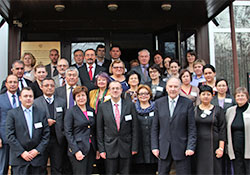WHO Collaborating Centre in Moscow signals new beginning for public health services

WHO
WHO is stepping up collaboration with countries in eastern Europe and central Asia to strengthen their public health services in view of the growing double burden of communicable and noncommunicable diseases in the region.
To signal this commitment, the WHO’s first collaborating centre on Health Systems and Public Health was recently launched in Moscow by a delegation of WHO/Europe together with representatives of the Russian Federation’s Ministry of Health and public health experts from the five central Asian countries and Azerbaijan, Belarus and the Republic of Moldova. The event included a workshop for delegates to review progress on implementing the European Action Plan for Strengthening Public Health Services and Capacity, a key policy tool adopted by WHO/Europe in 2012 to assist governments in assessing and improving their essential public health operations.
The meeting, which was held on 28-29 October 2014 at the Federal Research Institute for Health Organization and Informatics (FRIHOI) of the Ministry of Health, opened with remarks from Dr Vladimir Starodubov, Director of the Institute and Head of the new centre, and Dr Hans Kluge, Director of the Division of Health Systems and Public Health at WHO/Europe. Dr Kluge and Dr Elke Jakubowski, programme manager for public health services in the Division, jointly emphasized the centre’s role in championing health promotion and disease prevention, given its proximity to a cluster of countries which collectively have one of the lowest average life expectancy in the WHO European Region.
“The new WHO Collaborating Centre is an asset for public health collaboration in the Russian Federation and the Commonwealth of Independent States,” said Dr Kluge. Strengthening public health infrastructure and services, including through the exchange of experiences among public health institutions, currently does not rank high on most governments’ health agendas – with only about 3 percent of health budgets going towards prevention – and the Division of Health Systems and Public Health is committed to raising awareness and support to these functions.
A launch pad for strengthening regional networks
In the CIS countries, sustained and strategic action was also seen as crucial in the areas of training and retaining of public health professionals, optimizing public health services delivery structures and financing, and managing change in public health governance to tackle the burden of noncommunicable diseases more effectively.
In the medium- to long-term, a coordinated process of priority-setting and technical exchange among Russian-speaking countries will form the basis of a wider network for regional cooperation among leading public health institutions. The WHO Collaborating Centre on Health Systems and Public Health volunteered to serve as secretariat for this future network.
In the meantime, the designation as WHO Collaborating Centre is expected to improve national and regional recognition for FRIHOI, open up new opportunities for cooperation with institutions that share a commitment to improving population health, and mobilize additional funding resources to help carry out its mission. The centre is also expected to assist other countries in the region with their self-assessment and implementation of the European Action Plan for Strengthening Public Health Services and Capacity.
Dr Kluge acknowledged the already established collaborative relationship between FRIHOI and WHO/Europe, based on the successful completion of self-assessment in the Russian Federation.
WHO collaborating centres are institutions designated by the Director-General as part of an international collaborative network carrying out jointly planned activities that support WHO’s technical and implementation work at all levels.



